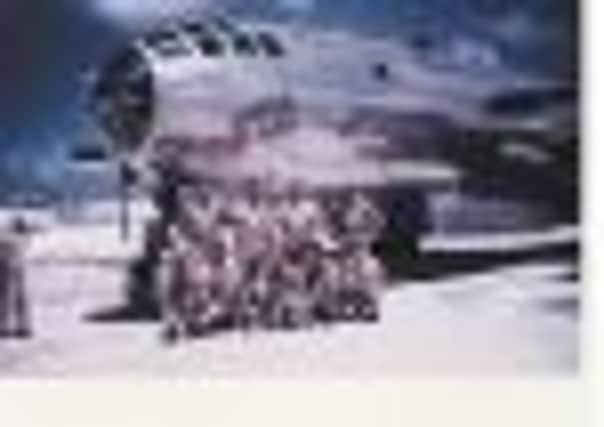WWII atom bomb attack is ‘biggest turning point’


With so many events to choose from in a turbulent century, the survey found that the majority of those asked, believed that the world’s first glimpse of the destructive power of nuclear weapons was the most defining moment of the era.
The use of nuclear weapons to bomb Hiroshima and Nagasaki was considered more pivotal than a series of other milestones, including the events that sparked the First World War and the fall of Communism in eastern Europe.
Advertisement
Hide AdAdvertisement
Hide AdThe revolutions of 1989 began in Poland, continuing in Hungary, East Germany, Bulgaria, Czechoslovakia and Romania. One feature common to most of these developments was the extensive use of campaigns of civil resistance, demonstrating popular opposition to the continuation of one-party rule and contributing to the pressure for change.
Key to the anti-Communist movement was the fall of the Berlin Wall, which served as the symbolic gateway to German reunification in 1990.
While historians might long debate which events since 1900 have had the greatest impact, the people polled identified the 9/11 attacks on the United States as more significant that Hitler’s rise to power in the 1930s.
Hitler’s ascent to dictatorship began when he joined the political party that was known as the Deutsche Arbeiterpartei, a group which was opposed to the democratic post-war government of the Weimar Republic.
After securing almost 14 million votes for the Nazi party and 230 seats in the Reichstag, Hitler’s control of more than 300 concentration camps in Germany and Poland led to the murder of almost six million European Jews during the Holocaust.
The research was commissioned by adult learning website Love to Learn, and marks the release of a new online course exploring “Turning Points in Modern History”.
The six-part course looks at the causes and effects of the assassination of Archduke Franz Ferdinand that went on to trigger the First World War, along with five other historical turning points that bring people up to the present day.
One month after Ferdinand and his wife Sophie were shot dead by Gavrilo Princip in Sarajevo, the conflict opened with the Austro-Hungarian invasion of Serbia, followed by the German invasion of Belgium, Luxembourg and France, and a Russian attack against Germany.
Advertisement
Hide AdAdvertisement
Hide AdThe research looks at how the over-50s perceive key events, starting from the beginning of the First World War to the destruction of the World Trade Center in 2001.
It found that more than one in four people (27 per cent) rated the end of the Second World War and dropping of the atomic bombs on Hiroshima and Nagasaki during the final stages of the conflict in 1945 as the most significant.
The Second World War ended in Europe on 8 May, 1945, after the Allies accepted Germany’s surrender a week after the death of Hitler. Winston Churchill announced VE Day – Victory in Europe - with street parties held all over Britain to celebrate.
Japan, however, did not surrender at the same time as Germany, with the bombings in Hiroshima and Nagasaki representing the only use of nuclear weapons in war to date. An estimated 150,000 to 220,000 people were killed in the two Japanese cities, with thousands more succumbing to the effects of burns and radiation sickness in the following months.
Japan formally surrendered to the Allies on September 2, 1945, finally ending the Second World War.
The next most significant event was thought to be the 9/11 attacks on New York and Washington, with 16 per cent of those polled rating the terrorist outrages that destroyed the Twin Towers as the most influential.
The plane hijackings by terrorists from militant group al-Qaeda resulted in the deaths of nearly 3,000 people, for which the group’s leader, Osama bin Laden, claimed responsibility in 2004.
A further plane was also crashed into the headquarters of the US department of defense, at the Pentagon, in Arlington, Virginia.
Advertisement
Hide AdAdvertisement
Hide AdJohn Child, historian and author, said: “History is not just about isolated events; it’s also about understanding their causes and evaluating their effects.
“Some famous events accelerate the pace of change but other, more momentous turning points in history create a world which is very different than it was before. The fascinating thing about this course is that it creates a debate about how significant each of these famous events really was. People really enjoy arguing the case for their own view.”
Opinions varied according to age with younger respondents in their early 50s putting more significance on more recent events such as 9/11. Adults in their 70s were more likely to cite the start of the Second World War and Hitler’s rise to power. The vast majority of those who took part in the research believed the turning points should be taught in schools.
More than three-quarters of people (77 per cent) said that the end of the Second World War and the dropping of the atomic bomb should continue to be taught in history lessons in British schools. More than half (54 per cent) believed that the archduke’s assassination leading to the First World War should continue to be on the curriculum.
Dr Sean Lang, senior lecturer in history at Anglia Ruskin University, said: “The research underpinning this online course suggests that different age groups, even among the over-50s, have different perspectives on this.
“Perhaps not surprisingly, those with longer memories tend to emphasise the significance of earlier events in history – they are, after all, well placed to know.”